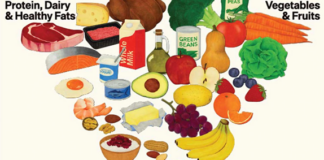
By Olivia Rosane,
By 2050, there will be 10 billion people on the earth, and global income will triple. Feeding more people with more money will increase the environmental pressures put on the planet by the global food system by between 50 and 92 percent. If nothing is done, those pressures will push Earth “beyond the planetary boundaries that define a safe operating space for humanity.”
That’s the starting point of a major new study published in Nature Wednesday that is the first to quantify how food production and consumption impacts the planet’s ability to sustain human life.
The food system gobbles up planetary resources in four key ways:
- It is a major contributor to climate change.
- Land use changes required for farming drive biodiversity loss.
- Agriculture uses up lots of fresh water.
- Nitrogen and phosphorus from fertilizer pollute land and water.
Luckily, the study also mapped a way out of this mess.
“Feeding a world population of 10 billion is possible, but only if we change the way we eat and the way we produce food,” research participant professor Johan Rockström at the Potsdam Institute for Climate Impact Research in Germany told The Guardian. “Greening the food sector or eating up our planet: this is what is on the menu today.”
The researchers found that greening the food sector depends on three major changes.
1. Diet
To keep warming below two degrees Celsius above pre-industrial levels, the world will have to change how it eats. What that means is different for the population at large and for people in wealthy countries like the U.S., but overall, researchers recommended a “flexitarian” diet that eschews meat in favor of beans and nuts.
For people in the U.S., that will mean:
- Eating 90 percent less beef, pork and lamb
- Eating 60 percent less poultry, milk and sugar
- Eating five times more lentils
- Eating more than four times more nuts and seeds
2. Waste:
It’s not just about how much we eat, but about how much we throw away. The researchers found that cutting food waste in half would reduce the environmental impacts of agriculture by 16 percent, BBC News reported.
“Tackling food loss and waste will require measures across the entire food chain, from storage, and transport, over food packaging and labeling to changes in legislation and business behavior that promote zero-waste supply chains,” Fabrice de Clerck, the director of science at food-system think tank EAT, which funded the study, told BBC News.
3. Farming:
In order to reduce the environmental footprint of food production, farming techniques themselves have to be changed. The study recommended increasing the yields on existing cropland, improving water use and storage and reducing or recycling fertilizer.
The agricultural changes required mean that altering our food system for the better isn’t just a matter of consumer choice.
“People can make a personal difference by changing their diet, but also by knocking on the doors of their politicians and saying we need better environmental regulations—that is also very important. Do not let politicians off the hook,” research leader and University of Oxford scientist Marco Springmann told The Guardian.
Netflix’s 'Rotten' Reveals the Perils of Global Food Production https://t.co/OzWJhzwWZY @foodandwater @OrganicConsumer @regeneration_in @foodtank
— EcoWatch (@EcoWatch) March 19, 2018
Source: https://www.ecowatch.com
Disclaimer: We at Prepare for Change (PFC) bring you information that is not offered by the mainstream news, and therefore may seem controversial. The opinions, views, statements, and/or information we present are not necessarily promoted, endorsed, espoused, or agreed to by Prepare for Change, its leadership Council, members, those who work with PFC, or those who read its content. However, they are hopefully provocative. Please use discernment! Use logical thinking, your own intuition and your own connection with Source, Spirit and Natural Laws to help you determine what is true and what is not. By sharing information and seeding dialogue, it is our goal to raise consciousness and awareness of higher truths to free us from enslavement of the matrix in this material realm.
Français
 EN
EN FR
FR



























I hope we get Replicators before 2022.
>>By 2050, there will be 10 billion people on the earth
That right there is the first and foremost problem to solve. This planet just does NOT need 3 billion more people! And particularly not in those 3rd world countries that are already plagued regularly by famines and/or rampant overcrowdling & poverty!
Population control WILL happen, one way or another. If people are smart, it will need to start being voluntarily rather than through wars over resources, starvation, pandemics (natural or ‘assisted’) or other some other unpleasant intentional means.
Not every family needs to breed. Good opportunity to clean the less desirable traits out the gene pool. I’m short, nearsighted as hell and have flat feet. So, I’m doing my part by not having kids 🙂
Don’t sit there and try to tell us that we have to give up all the good food and eat bugs and beans just so there will be enough for 3 billion more people who aren’t alive yet. The key is to not let them become alive in the first place. Mama Gaia and all our other relations on this planet will also not be very happy to see that many more of us…
Well, you’re correct about the planet not needing more people. But to assert that we can continue to eat food that is unhealthy for us, as well as the planet, is incorrect. Hopefully the government will stop subsidies to animal foods and if anything, direct subsidies to foods that are beneficial to all parties. Also, people who come from wealthy countries use far more natural resources. But whatever.